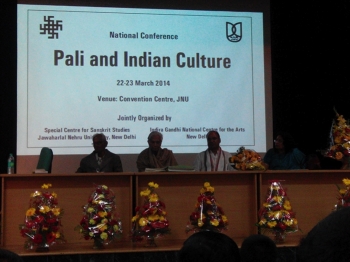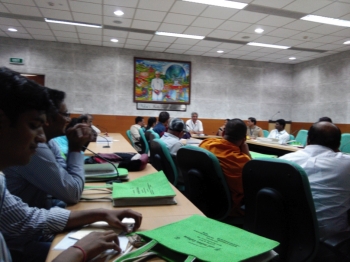In the conference’s inaugural speech, Professor Sopory pointed out that: “The various facets of Indian history and culture are preserved in a systematic manner in Pali. Through Pali literature one can have a deeper understanding of Buddhism and the Buddha’s incomparable teachings.” He further mentioned that Pāli language “reflects the true and invaluable treasure of India.”
The conference director, Professor C. Upender Rao (Professor of Pāli language and literature at the Special Centre for Sanskrit Studies of JNU), said in his published message that though Pali language may not be very popular in India, its influence can be felt all over India in the use of different Pāli words in modern Indian languages.
During the life time of the Buddha and even several centuries after the Mahāparinibbāna, the term Pāli was not used to refer to a language or even to refer to the teachings of the Buddha (Buddhavacana). However, in the course of time, the term Pāli acquired the meaning of the Buddha’s Teaching in the Theravāda School.
The keynote speaker of the conference was the 92-year old Professor N.H. Samtani, a retired professor of Banaras Hindu University (BHU), Varanasi. Professor Samtani was a recipient of the Indian President’s Certificate of Honor in 1999 for his work on Pāli language. He said in his speech that Pāli language was headed for a bright future in India: with the resurgence in the popularity of Buddhism, more and more people were beginning to show interest in its study. The valedictory speech was given by Professor Lokesh Chandra, an eminent scholar of Buddhism and writer of books commonly found on university bookshelves (1).
The concluding day of the conference saw a short movie in Pāli prepared by Professor C. Upender Rao and his team called Sanradhatuvibhajanam (Division of the Relics). The dialogue of the movie was in Pali and mostly based on the Mahaparinibbana Sutta of the Digha Nikaya. According to the story related here, eight different clans aggressively claimed a share in the Buddha’s relics. A sage called Dona pacified all of them by distributing the relics in eight equal shares. The movie drew keen interest and admiration from critics.
Note
(1) Among the eminent professors present at the conference were Pradyumna Dubey (BHU), Rev. J. Dhammaloka (Peradenia University), Ven, Galle Dhamminda (Peradeniya University), R.N. Singh (Jammu University), B.N. Labh (Jammu University), K.T.S. Sarao (Delhi University), Neekee Chaturvedi (Jaipur University), Har Prasad Dixit (SS University), R.K. Dwivedi (SS University), Bela Bhattacharya (Calcutta University), Saswati Matsuddy (Calcutta University), Siddharth Singh (BHU), U.S. Vyas (Navanālandā Mahāvihāra), Mahesh Deokar (Pune University), Priti Dubey (BHU), P.K. Palit (Assam University), H.S. Shukla (BHU), and Ujjwal Kumar (Pune University).
Prof. K.T. Sarao is Professor at the Department of Buddhist Studies at the University of Delhi. He has published widely on Buddhist scholarship, held academic posts around the world, and has been conferred many professional affiliations and academic honors. He is also a freelance Correspondent for Buddhistdoor International.
Back to Buddhist News
Prof. K.T. Sarao is Professor at the Department of Buddhist Studies at the University of Delhi. He has published widely on Buddhist scholarship, held academic posts around the world, and has been conferred many professional affiliations and academic honors. He is also a freelance Correspondent for Buddhistdoor International.
Back to Buddhist News
















